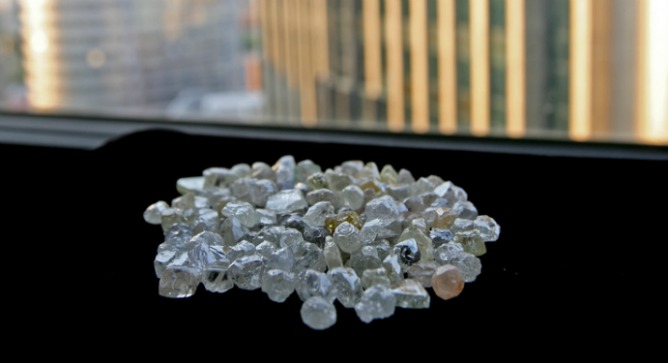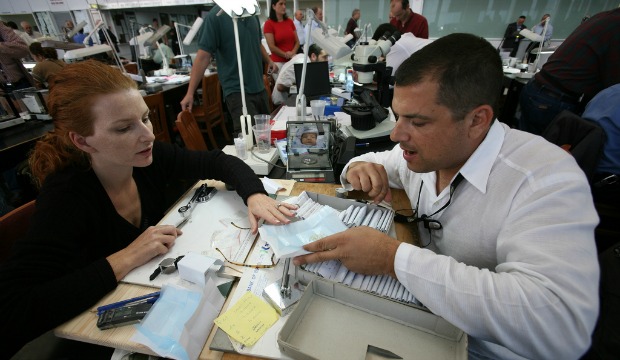White or yellow, round, brilliant, heart or rose cut in one carat or two? Whatever the style, or size, diamonds are still a girl’s best friend, and the engagement ring stone of choice for young Americans. As the leader in the industry, the Gemological Institute of America (GIA) sets the standard for assessing diamond quality and value.
This gold standard in the diamond industry has now set up shop in Israel, the fourth-largest diamond market in the world. The center, one of 16 across the world, will include the eighth diamond lab in the world — the sixth outside the United States. It is based in the Israel Diamond Center in Ramat Gan and currently employs 20 people.
Spread the Word
• Email this article to friends or colleagues
• Share this article on Facebook or Twitter
• Write about and link to this article on your blog
• Local relevancy? Send this article to your local press
The opening of the center will cut the time to market, and reduce risks and insurance premiums of Israeli-traded diamonds in the industry, says Udi Sheintal, managing director of the Israel Diamond Institute, the non-profit organization that encouraged the GIA to come to Israel.
The Israeli diamond market was worth about $20 billion in 2011, he says. Until now, Israeli diamond traders would buy their raw diamonds close to the source outside of Israel, or in a trade, and then ship the diamond to the United States in order to get a certificate of quality issued by the GIA. This created backlogs of weeks and months, and a high cost associated with insurance premiums while the gems were in transit.
Having an American center of excellence in Israel will accelerate Israeli diamond turnover, Sheintal says.
A dazzling educational center
No less important for international trade with Israel, in the next phase in the coming year or two, the GIA will create an educational and learning center for cutting and polishing diamonds at the Israeli facility. It will be one of a handful of such facilities outside the United States.
“Once there is a school and training in place it will give a boost to the industry,” Sheintal believes.
Expected to enroll about 100 students a year, this new center could attract young Europeans looking to be diamantaires — diamond manufacturers or producers. Normally trainees go to the GIA’s centers in Carlsbad, California, or New York City. For Europeans, Israel is a much shorter plane ride away, and with fewer time zones to cross.
Sheintal doesn’t think the move will attract more buyers and sellers to Israel, but the process will cut costs, which may be translated to the seller and ultimately the end buyer.
“The easiest thing would be for the GIA to stay in the United States, but we convinced them that this is the place to be,” says Sheintal, who heads an umbrella organization to help Israeli diamond traders in the international marketplace.
The center came about after intense negotiations with the Israel Diamond Institute and the Israel Diamond Manufacturers Association.
“The GIA is the world-leading center for gemological certifications, which is grading diamonds,” Sheintal tells ISRAEL21c. “This is the most appreciated certificate in the diamond industry, and their labs are the most respected in the world – they are like the Rolls Royce of standards, mainly because they are a non-profit organization.”
It is customary for any diamond weighing more than one-third of a carat to come with a certificate estimating the stone’s worth, along with a gemological report looking at the “four Cs” — color, clarity, cut and carat.
A history of fair trade
While the GIA certificates do not specify whether or not the gem is a fair-trade, cruelty-free diamond, Sheintal assures that every diamond trader in the Israeli industry is well aware of the problem of blood diamonds.
In fact, he notes, Israel was one of the founders of the Kimberly Process to stop the trade of blood diamonds, he tells ISRAEL21c. “We were there when the process was started 10 years ago, and the rules and regulations are adhered to by the Diamond Controller’s Office in Israel’s Ministry of Industry, Trade and Labor,” he says.
With a history of the Holocaust behind them, “none of our members had a problem with those rules and regulations. I can say that no one can identify more with [conflict and suffering] than the Israeli diamond community. It’s easy for them to identify with what’s happening in other parts of the world and to be part of the effort to stop the suffering.”
Sheintal hopes that Arabs from the West Bank, Jordan and elsewhere will take advantage of this new diamond center in Israel as a learning hub.
“Israel has long been a center for the global diamond trade,” said Donna Baker, GIA president and CEO, who came to Israel in September to inaugurate the new center. “We hope that having direct access to GIA diamond grading services in Israel will support the success of Israeli companies.”














